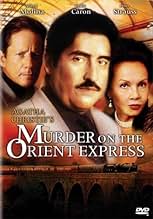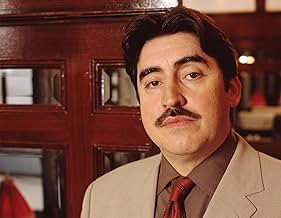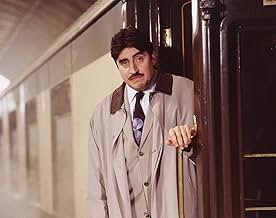IMDb-BEWERTUNG
5,1/10
1222
IHRE BEWERTUNG
Füge eine Handlung in deiner Sprache hinzuHercule Poirot, now in modern times, investigates the famous crime on the famed train with a modern twist.Hercule Poirot, now in modern times, investigates the famous crime on the famed train with a modern twist.Hercule Poirot, now in modern times, investigates the famous crime on the famed train with a modern twist.
- Regie
- Drehbuch
- Hauptbesetzung
Louis Chamoun
- Turk
- (Nicht genannt)
Jason Croot
- Train Guard
- (Nicht genannt)
Empfohlene Bewertungen
Any new version of the classic Agatha Christie is almost certain to invite unfavourable comparisons with the 1974 cinema version in which Sidney Lumet directed a star studded cast in a lavish and expensive treatment of the book. This television movie is a less star studded affair and adds to its problems by setting the story in the present day ,complete with laptop computers and mobile phones ,thereby losing the period settings which are so essential a part of the writers continuing appeal. The plot remains the same -a passenger on board the famed train is killed and Hercule Poirot investigates and solves the mystery by the application of the "little gray cells" Alfred Molina does a fair job of Poirot and I would like to see him tackle the role in a better production ;while Leslie Caron and Peter Strauss are good in supporting roles. A pointless remake and I would advise going back to the 1974 picture if you want to see a movie of the book
This is a made for TV movie. Made for TV movies rarely match up to made for cinema movies. But yes, see it - if you've seen the Lumet original that is. It's better than nothing and the story is of course great.
About the story: actually it's better if you see the Lumet version first (and even read the book) because it's an amazing story and because you'll find the screenwriters for this version have done the unforgivable again.
The acting's OK, the direction is basically OK too (although there are some scenes that just die) but above and beyond anything else it's the screenplay which sends this one to the skip.
Why do these people take a winning formula and think they can make a classic like this better? The original had poetry. There was symmetry and symbolism which gave the audience warmth. This insensitive screenwriter seems to not have understood the small masterpiece he was commissioned to update.
For that matter, why remake it at all? Dare we speculate? Someone's nephew wanted a chance at screen writing? Someone with clout in a studio decided to back this one?
It's not all negative. There are good moments too. And unlike others here, we thought Molina was good.
But you don't go corrupting a winning formula. See it - but only after you've seen the Lumet original (and preferably read the book). Only then will any enjoyment be guaranteed.
About the story: actually it's better if you see the Lumet version first (and even read the book) because it's an amazing story and because you'll find the screenwriters for this version have done the unforgivable again.
The acting's OK, the direction is basically OK too (although there are some scenes that just die) but above and beyond anything else it's the screenplay which sends this one to the skip.
Why do these people take a winning formula and think they can make a classic like this better? The original had poetry. There was symmetry and symbolism which gave the audience warmth. This insensitive screenwriter seems to not have understood the small masterpiece he was commissioned to update.
For that matter, why remake it at all? Dare we speculate? Someone's nephew wanted a chance at screen writing? Someone with clout in a studio decided to back this one?
It's not all negative. There are good moments too. And unlike others here, we thought Molina was good.
But you don't go corrupting a winning formula. See it - but only after you've seen the Lumet original (and preferably read the book). Only then will any enjoyment be guaranteed.
Having seen the theatrical film version of "Murder on the Orient Express" when it was first released back in the 1970's, and having thoroughly enjoyed it, I was very skeptical about a remake of it, especially knowing that this production was made for CBS-TV and being giving its first airing on commercial television, instead of being done on PBS's "Mystery".
My radar shot up the minute I heard John Leonard's favorable review of it on "CBS Sunday Morning". Leonard is an extremely articulate, pseudopoetic writer, and more often than not, a sardonic and harsh critic, and he does not endorse remakes of popular hits easily--except, perhaps, when they air on CBS, the network he just happens to work for.
My fears were fully justified. This film is the most crass retelling of an Agatha Christie novel I have ever seen. The story has been updated from 1934 to the present in order to give Hercule Poirot the oh-so-trendy oppotunity to work on the case by plugging into a laptop. The glamorous aspects of the original film, with its elegant, stylish, upper-class look, are totally gone.
So, instead of getting butlers and former army colonels as suspects, we get fitness experts and trainers who run around in T-shirts and sports coats, and who speak with Bronx accents. And Meredith Baxter, of all people, plays Mrs. Hubbard, the compulsive talker played so well in the original by the legendary Lauren Bacall. In fact, none of the performances here are memorable, especially when they have to compete against the likes of Ingrid Bergman, Vanessa Redgrave, John Gielgud, Sean Connery, Richard Widmark (whose character is played here by Peter Strauss!), Martin Balsam, Jacqueline Bisset, Wendy Hiller, and Michael York. And Alfred Molina, while quite good as Hercule Poirot, still can't hold a candle to Albert Finney in the original, not to mention Peter Ustinov and David Suchet as later incarnations of the detective.
Worse yet, while some seemingly small details have been left the same, some vitally important ones have been changed, one of them being the number of passengers, an important element in the original. Some of Poirot's deductions, rather than being revealed as surprises toward the end, are explained about two-thirds of the way through.
But the vilest crime committed in this film, is the implication, at the end, that Poirot has been having, shall we say, a less-than-platonic relationship with a beautiful woman! (She appears out of nowhere in the final scene, smiling at him, and calling him "Hercule".) This, an utter desecration of the 'cold-fish" Poirot that we all know and love, is a betrayal as sacrilegeous as William Gillette having Sherlock Holmes fall in love in his 19th century stage play!
Avoid this, unless you are masohistic, have a relative in the cast, or think that TV remakes are always better than the original films.
My radar shot up the minute I heard John Leonard's favorable review of it on "CBS Sunday Morning". Leonard is an extremely articulate, pseudopoetic writer, and more often than not, a sardonic and harsh critic, and he does not endorse remakes of popular hits easily--except, perhaps, when they air on CBS, the network he just happens to work for.
My fears were fully justified. This film is the most crass retelling of an Agatha Christie novel I have ever seen. The story has been updated from 1934 to the present in order to give Hercule Poirot the oh-so-trendy oppotunity to work on the case by plugging into a laptop. The glamorous aspects of the original film, with its elegant, stylish, upper-class look, are totally gone.
So, instead of getting butlers and former army colonels as suspects, we get fitness experts and trainers who run around in T-shirts and sports coats, and who speak with Bronx accents. And Meredith Baxter, of all people, plays Mrs. Hubbard, the compulsive talker played so well in the original by the legendary Lauren Bacall. In fact, none of the performances here are memorable, especially when they have to compete against the likes of Ingrid Bergman, Vanessa Redgrave, John Gielgud, Sean Connery, Richard Widmark (whose character is played here by Peter Strauss!), Martin Balsam, Jacqueline Bisset, Wendy Hiller, and Michael York. And Alfred Molina, while quite good as Hercule Poirot, still can't hold a candle to Albert Finney in the original, not to mention Peter Ustinov and David Suchet as later incarnations of the detective.
Worse yet, while some seemingly small details have been left the same, some vitally important ones have been changed, one of them being the number of passengers, an important element in the original. Some of Poirot's deductions, rather than being revealed as surprises toward the end, are explained about two-thirds of the way through.
But the vilest crime committed in this film, is the implication, at the end, that Poirot has been having, shall we say, a less-than-platonic relationship with a beautiful woman! (She appears out of nowhere in the final scene, smiling at him, and calling him "Hercule".) This, an utter desecration of the 'cold-fish" Poirot that we all know and love, is a betrayal as sacrilegeous as William Gillette having Sherlock Holmes fall in love in his 19th century stage play!
Avoid this, unless you are masohistic, have a relative in the cast, or think that TV remakes are always better than the original films.
The 1974 movie of this book was a mixed bag. Obligations to the all-star cast caused most of the problems, as the writers and editors jockeyed to give everyone an equitable amount of screen time, an actorly moment and some close-ups. This prevented it from being a very deep film, and Sidney Lumet is really only a workmanlike filmmaker. But still, despite those limitations, there is much pleasure in the earlier version; the wordless flashback prologue of a kidnapping is beautifully done. Rare for a murder mystery, the unfolding of the solution provides a startling, satisfying emotional payload.
For this retelling, a decision was made to update the material to the contemporary era. The topical references that acknowledge the world has changed since the thirties really achieve naught, except perhaps alleviating some writers fear that the material is passé... There's too many of these self-conscious references (to air travel, the internet, VCRs, taking the Express out of mothballs, Ross Perot) and they become annoying. Other changes are there simply because filmmakers thought it would make it more conventional (Hercule Poirot has a ridiculous romantic interest, "Vera"). The biggest bummer is the substitution of a utilitarian diesel engine for the original stylish steam locomotive. Thud.
Ultimately these revisions add nothing to the movie and seem to have taken the focus off producing a tight, compelling, methodical script.
The highlight of the previous movie was the cross-cutting between the temporal time-frame and the crime. This movie lifts that technique, but doesn't really come up with any contribution of it's own. The color palette, the research and the envisioning of the crime were all more vivid in the earlier version.
Alfred Molina is pretty bad in this. It just isn't interesting.
For this retelling, a decision was made to update the material to the contemporary era. The topical references that acknowledge the world has changed since the thirties really achieve naught, except perhaps alleviating some writers fear that the material is passé... There's too many of these self-conscious references (to air travel, the internet, VCRs, taking the Express out of mothballs, Ross Perot) and they become annoying. Other changes are there simply because filmmakers thought it would make it more conventional (Hercule Poirot has a ridiculous romantic interest, "Vera"). The biggest bummer is the substitution of a utilitarian diesel engine for the original stylish steam locomotive. Thud.
Ultimately these revisions add nothing to the movie and seem to have taken the focus off producing a tight, compelling, methodical script.
The highlight of the previous movie was the cross-cutting between the temporal time-frame and the crime. This movie lifts that technique, but doesn't really come up with any contribution of it's own. The color palette, the research and the envisioning of the crime were all more vivid in the earlier version.
Alfred Molina is pretty bad in this. It just isn't interesting.
This is an awful adaptation.
It's so obvious that CBS just dragged this out again to maximize the popularity of Alfred Molina these days (Spiderman 2, Fiddler on the Roof).
The only aspect of this production that held my interest was the set design/art direction. The acting was totally "Movie of the Week", as was the script.
This really did not need to be udpated. Who was it updated for? Those that enjoyed the original will be disappointed.
It's just dreadful.
Avoid it.
It's so obvious that CBS just dragged this out again to maximize the popularity of Alfred Molina these days (Spiderman 2, Fiddler on the Roof).
The only aspect of this production that held my interest was the set design/art direction. The acting was totally "Movie of the Week", as was the script.
This really did not need to be udpated. Who was it updated for? Those that enjoyed the original will be disappointed.
It's just dreadful.
Avoid it.
WUSSTEST DU SCHON:
- WissenswertesCarl Schenkel's last film.
- PatzerIn the next exterior shot after departure from Istanbul, a differently colored diesel locomotive is on the train. During the night scenes before the journey is interrupted, a steam locomotive is shown. Then when the train stops at the rockfall, the same EWS diesel is back on it, but now it's facing the other way (the EWS letters and the locomotive number 47744 have swapped places as seen from the same side of the train). Finally, when the journey resumes the next night, the steam locomotive is back.
- Zitate
Mr. Samuel Ratchett: Mr. Perot?
Hercule Poirot: Perot? Like the American Presidential candidate? Certainly not! The name is Poirot! Hercule Poirot!
- VerbindungenReferenced in David Suchet on the Orient Express (2010)
Top-Auswahl
Melde dich zum Bewerten an und greife auf die Watchlist für personalisierte Empfehlungen zu.
Details
- Erscheinungsdatum
- Herkunftsland
- Sprachen
- Auch bekannt als
- Murder on the Orient Express
- Drehorte
- Istanbul, Türkei(on location)
- Produktionsfirmen
- Weitere beteiligte Unternehmen bei IMDbPro anzeigen
Zu dieser Seite beitragen
Bearbeitung vorschlagen oder fehlenden Inhalt hinzufügen

Oberste Lücke
By what name was Mord im Orient Express (2001) officially released in Canada in English?
Antwort





























